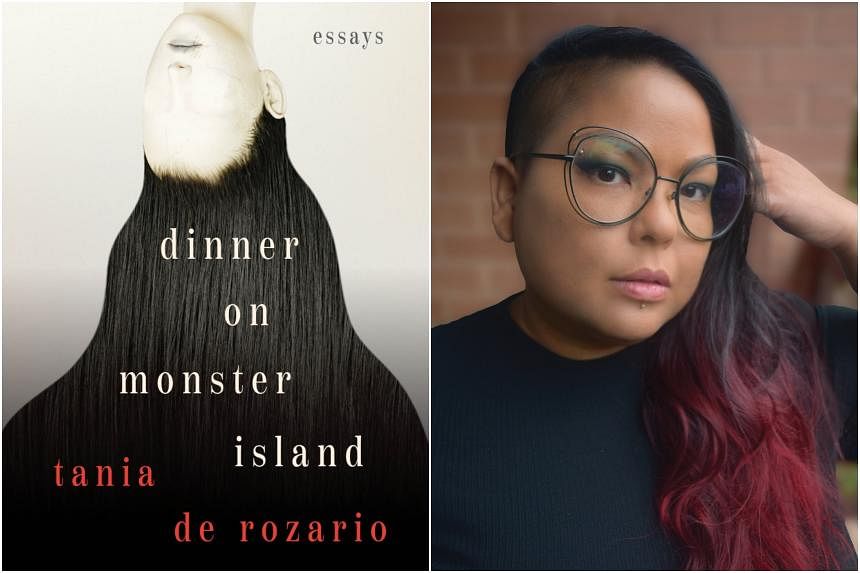Dinner On Monster Island: Essays
By Tania De Rozario
Essays/Harper Perennial/Paperback/192 pages/$23.01/Amazon SG (amzn.to/3V0Ntj2)
4 stars
What can monstrous women in cinema history – the devilish Carrie White in Carrie (2013), the vengeful Thai ghost Natre who haunts her former boyfriend in Shutter (2004), Sadako with her waist-length black hair from Ring (1998) – teach one about growing up on the fringes of society?
For Vancouver-based artist Tania De Rozario, these monsters are her kin – having grown up as a queer, brown and fat girl in Singapore.
In this new work, published by Harper Perennial, she performs sharp, cosmopolitan film criticism from her position of alterity to dissect the horrors of her adolescence with an unflinching candour rarely seen in the genre of memoir in Singapore literature.
This is a memoir that roots her self-identity as an adult in her Singaporean adolescence, growing up in a country she describes as having a “habit of micromanaging the bodies of its citizens”.
She excoriates the trauma of the Trim and Fit (TAF) club in warping her body image, for example, and recalls mortifyingly what her classmates in her all-girls secondary school termed the school’s Lesbian Elimination Squad, or LES.
De Rozario’s late parents are presences which haunt the book and, one suspects, a major animating force behind her memoir. “Most people familiar with my work know two formative things about my life: that my mother tried to have the gay exorcised out of me when I was a kid and that my father died by suicide when I was nine years old.”
The memoir is deliberately disinterested in analysing conventional films that deal with sexuality or race in any straightforward manner, as De Rozario expresses a suspicion towards palatable representations of marginal lives.
Instead, she follows the ethos of film theorist Andrew Scahill that queer spectators – be they of marginal gender, sexuality or race – do not just accept films on the surface, but also behave like scavengers.
“We read queerness into characters who are outcasts, who dress differently, who are bullied. We read queerness into that which is desperate, liminal – into monsters and ghosts if we have to.”
The result is cultural criticism that feels fresh and original, as De Rozario sees horror not just as activating the fear factor, but also as a kind of comedy or queer heroism.
The book is a valuable addition to the recent wave of genre-bending memoiristic writing coming out from Singapore, including Daryl Li’s debut The Inventors (2023) and Max Pasakorn’s chapbook A Study In Our Selves (2023).
Where the first part of De Rozario’s book digs into the trauma of bewildering adolescence, the second part sees her move into young adulthood – and deal with another set of Singapore cultural productions that also serve as sharp social commentary.
These include Singaporean director Tan Pin Pin’s movie Moving House (2001), the National Library Board’s pulping controversy around the tale of two male penguins in And Tango Makes Three (2005) in 2014, as well as the evolution of arts censorship in Singapore.
The book ends with De Rozario’s letter to her mother and, although harking back to the first section of her memoir, reads less satisfactorily as an ending in an otherwise propulsive memoir.
For those waiting on the follow-up to De Rozario’s poetic diction in her Singapore Literature Prize-shortlisted Tender Delirium (2013) and her queer memoir And The Walls Come Crumbling Down (2016), which was a Lambda Literary Award finalist, Dinner On Monster Island brings out the best of the poet and memoirist.
At its best, the book asks readers to reconsider the instinct of rejecting the monstrous and to look harder, read closer.
If you like this, read: This Young Monster by Charlie Fox (Fitzcarraldo Editions, 2017, $29.48, Amazon SG, go to amzn.to/3uYa6de). The London-based writer’s cultural criticism discusses works such as David Lynch’s Twin Peaks and the photographs of Diane Arbus, which touch on similar ideas of monstrosity.

